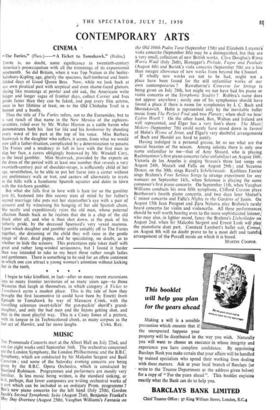CONTEMPORARY ARTS
CINEMA
"The Furies." (Plaza.)---cc A Ticket to Tomahawk." (Rialto.) THERE is; no doubt, some significance in twentieth-century America's preoccupation with all the trimmings of its expansionist nineteenth. So did Britain, when it was Top Nation in the Seeley- Salisbury-Kipling age, glorify the spacious, half-timbered and linen- folded days of Good Queen Bess. Now, while we look back at our own piratical past with sceptical and even shame-faced glances, shying like mustangs at pewter and old oak, the Americans write longer and longer sagas of frontier days, collect Currier and Ives prints faster than they can be faked, and pop every film actress, once in her lifetime at least, on to the Old Chisholm Trail in a bonnet and a bustle.
Thus the title of The Furies refers, not to the Eumenides, but to a vast ranch of that name in the New Mexico of the eighteen- seventies, ruled over by Mr. Walter Huston as a cattle baron who demonstrates both his lust for life and his bonhomie by shouting every word of his part at the top of his voice. Miss Barbara Stanwyck is the daughter who suffers, it seems, from what we would now call a father-fixation, complicated by a determination to possess The Furies and a tendency to fall in love with the first man to slap her face, a caress obligingly bestowed by Mr. Wendell Cory, as the local gambler. Miss Stanwyck, provided by the experts on the dress of the period with at least one number that reveals a very twentieth-century pair of shoulder-straps, is sufficiently child of her age, nevertheless, to be able to put her horse into a canter without any preliminary walk or trot, and canters off alternately to trysts in the hills with a handsome Spanish squatter and dates in town with the tin-horn gambler.
But what she falls first in love with is hate (or so the gambler puts it), hastened into this uncosy state of mind by her father's second marriage (she puts out her stepmother's eye with a pair of scissors) and by witnessing his hanging of her old Spanish chum. She neatly and expeditiously ruins the old man, whose paternal affection floods back as he realises that she is a chip of the old block after all, and who is then shot down, at the peak of his fatherly pride, by the deceased Spaniard's very vexed mamma. Upon which daughter and gambler amble amiably off to The Furies together, she dreaming of the child they will raise in the gentle image of dear, dead pappa, and he speculating, no doubt, as to whether to hide the scissors. This pretentious epic takes itself with great and rather long-winded seriousness, but I found it harder than was intended to take to my heart these rather rough ladies and gentlemen. There is something to be said for an effete continent in which one can attract a young woman's attention without kicking her in the teeth.
I begin to take kindliest, in fact—after so many recent excursions into so many frontier territories of so many years ago—to those Westerns that laugh at themselves, in which category A Ticket to Tomahawk earns a modest place. This is the tale of how they brought the first locomotive (it could have been by Emett) from Epitaph to Tomahawk by way of Massacre Creek, with the travelling salesman sweet-talkin' the gun-packin' sheriff's grand- daughter, and only the bad men and the Injuns getting shot, and that in the most playful way. This is a Casey Jones of a picture, with its tongue in its Technicolored cheek, as many corpses as the last act of Hamlet, and far more laughs. CYRIL RAY.


































 Previous page
Previous page